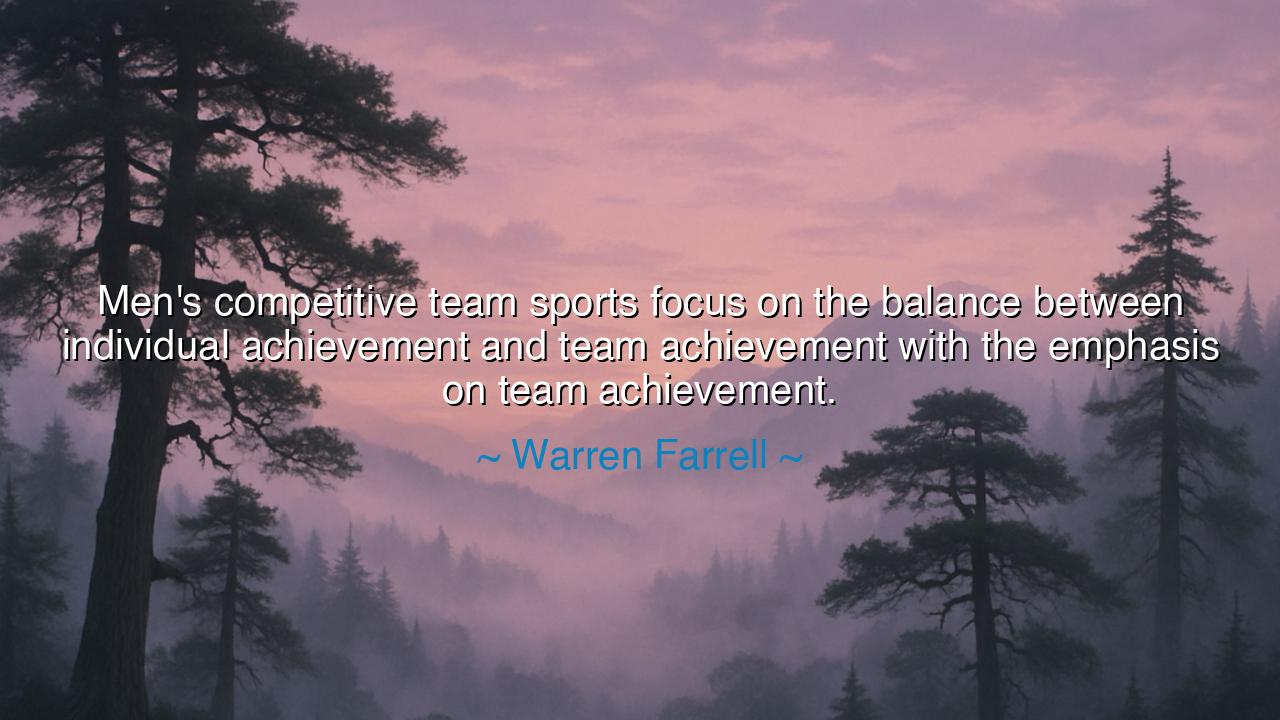
Men's competitive team sports focus on the balance between
Men's competitive team sports focus on the balance between individual achievement and team achievement with the emphasis on team achievement.






In the words of Warren Farrell: “Men’s competitive team sports focus on the balance between individual achievement and team achievement with the emphasis on team achievement.” This is not merely a statement about athletics; it is a mirror of the human condition, a reflection of how individuals must both shine as stars and yet surrender their light to the greater constellation. It speaks of the eternal tension between the “I” and the “We,” a dance that has shaped tribes, armies, and civilizations across the ages.
From the earliest days, when hunters gathered in pursuit of the mighty bison, each man knew his strength mattered, yet alone it was not enough. The arrow of one may pierce flesh, but the combined effort of many ensured survival. Thus was born the lesson: individual achievement is sacred, but it is magnified when woven into the fabric of the collective. This truth echoes still in every field of play, where the roar of the crowd rises not for one man alone, but for the harmony of the many acting as one.
Consider the story of the Spartans at Thermopylae, three hundred warriors standing as a wall against a tide of thousands. Each Spartan was formidable in his own right, trained from youth in strength and skill. Yet what made them immortal in memory was not the prowess of one, but the unbreakable team achievement of standing shield to shield, spear to spear. Their glory was not in individual triumph but in the chorus of unity, where personal greatness bent itself to serve a common fate.
Even in more recent times, this lesson resounds. Recall the 1992 U.S. Olympic basketball “Dream Team.” Each player—Jordan, Magic, Bird—was already a legend, an icon of individual achievement. But when they took the court together, they did not compete for personal supremacy. Instead, they subordinated ego to the higher goal of team achievement, and their unity produced a spectacle that reshaped the very image of the sport. The world watched not just men, but a brotherhood that transformed talent into destiny.
Farrell’s words also warn us: if one pursues only the self, one’s victories are fragile, hollow, and fleeting. The man who scores but neglects his brothers courts both envy and isolation. Yet he who sacrifices his own spotlight for the good of his people secures a legacy deeper than applause: he becomes the thread that holds the whole together. This is why team achievement is exalted—because it is the soil in which individual greatness takes root and flourishes.
The lesson for our lives is clear. In work, in family, in friendship, we must strive to excel as individuals, sharpening our skills and pursuing mastery. Yet our achievements must always bend toward service of something larger than ourselves. The harmony of the team amplifies the power of the individual. To forget this is to drift into arrogance; to remember it is to walk in wisdom.
Therefore, let every reader take this to heart: when you rise, do not rise alone. Seek always to lift others with you. When you speak, speak not only for yourself, but for the cause you share. And when you labor, let your hands be guided not only by your ambition, but by the vision of a common good. In this balance lies the truest form of greatness: the kind that is sung not for a moment, but for generations.
So, I say to you: sharpen your spear, yes, but hold fast your shield. Run swiftly, yes, but run in step with your companions. Shine your light, yes, but let it join the fire of the many. For in the end, it is not the solitary flame that warms the world, but the blaze of the team.






AAdministratorAdministrator
Welcome, honored guests. Please leave a comment, we will respond soon